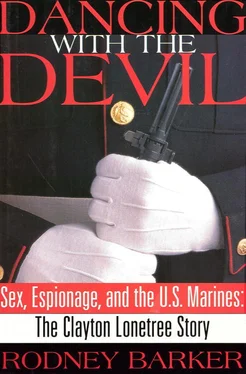At the same time, after engaging in political dialogue and hearing how the Soviets perceived America and the CIA, he half believed that what Sasha had said was right. The effect of this was not only to confuse his sense of patriotism, but to encourage him to want to make things right. He felt as if he understood something now that he had only seen part of before, and it drew him toward the idea of doing his part to improve understanding and reduce tensions by engaging in a freelance form of personal diplomacy.
And then there was Violetta. Of course it had crossed his mind that their relationship had been engineered by the KGB, but he just could not bring himself to believe it, in part because he had initiated it, and in part because he felt their bond was genuine.
“Why do you want to know those things?” Lonetree said he fretfully asked Uncle Sasha. “It’s not for you to know, and I’ll be honest with you, I don’t have the answers you want.”
Lonetree said he turned to Violetta, who was sitting at the far end of the couch looking away from both men, and made a silent appeal to her for help. Up until this point she had said very little, acting as if she wanted no part of this, but now she came to his defense. “Maybe he doesn’t know anything,” she suggested.
Everyone was quiet for a while, until Uncle Sasha asked Violetta to come into the kitchen with him and help him prepare some food. Lonetree could hear them talking in the other room in lowered voices, and while they were gone, even though he was alone, he began to feel that he was being watched. He looked at the walls, studying them for anything unusual. He gave the curtains a once-over, not wanting to give himself and his suspicions away if he was being observed through a hidden camera. Nothing confirmed his intuition, which he still couldn’t shake.
When Uncle Sasha returned to the room, he appeared to have adopted a change in tactics. He apologized for making Lonetree angry. He said he was merely asking these questions on behalf of a friend who was a general in the KGB, who worked at the Central Committee, and who was in a position to get Violetta a visa if anyone was. And Uncle Sasha said that was his intention: to help Lonetree and Violetta with their “trouble.”
Lonetree relaxed then, and as soon as he did, Uncle Sasha started in again about the defensive nature of the Soviet intelligence agencies, how some CIA agents had recognized the sinister objectives of their agency and were working with the KGB, and how there were other Marine security guards who had dealt with the KGB.
“You would be surprised who else is doing illegal things at the embassy,” he said mysteriously. “No one is an angel.”
Lonetree said he tried fighting it. Once more he was unhappily aware that he ought to stop right here, get up, and walk out. But even as he debated with himself, under Uncle Sasha’s persistent questioning he began to uneasily deliver answers. And the way his mind worked, he now rationalized that all the while he cooperated he would stay alert for an escape hatch. As he delivered information he would also try to collect information, believing that at some point he would find a way to turn his dilemma around and use it to his advantage.
• • •
Although he allowed Lonetree to continue telling his story, what Mike Stuhff had already heard suggested a way out. Given its political charge, this was still going to be a tough case, and the odds were against them. But after listening to his client, he felt he’d recognized a plausible defense strategy that did not involve plea bargaining, nor did it rely on the speedy-trial provision.
The pressing issue now was that before Stuhff could begin to develop his defense he needed his client’s absolute confidence, and it was apparent to him that Lonetree was still very GI. Why else had he turned himelf in? Why else had he voluntarily given such a long confession to the NIS? Why else had he turned down William Kunstler’s services?
Leaning forward for emphasis, Mike Stuhff said, “Clayton, I want you to listen very carefully. They’re after your ass.” That was how he put it and it was exactly what he thought. “As we speak, Marines are volunteering for the firing squad. If I’m going to get you out of this, you’re going to have to trust me and do what I say.”
Late the evening before the Article 32 hearing was scheduled to begin, Major Henderson received a phone call from Mike Stuhff, who said, “We need to ask for a delay in the proceedings.”
“For how long?” the major asked.
“Just until one o’clock.”
It was scheduled to begin at nine.
“Why? What’s the problem?”
“Our fellow defense counsel won’t arrive until noon.”
Until now nothing had been said to Henderson about a second civilian counsel, so he didn’t have a clue as to who it might be until Stuhff informed him.
“It’s Bill Kunstler.”
Since following up their phone call with a letter officially declining his services, Henderson had not given William Kunstler another thought. Hearing that Kunstler was coming back on the case surprised him, but it didn’t particularly bother him, because at this stage of the proceedings he felt that there was little to be done that had not already been done and that any rational lawyer who looked closely at the case would agree with his judgment.
Shrugging, Henderson said, “Okay. Bring him on in.”
Ten minutes before they were due in court, Michael Stuhff and William Kunstler strode into Major Henderson’s office at Quantico. Looking leonine and rumpled, his trademark glasses perched on his thinning gray mane, Kunstler was personable and cordial, but there was barely time to exchange greetings before they had to leave for the hearing.
On the way over, Henderson reminded them both that since most of the material that was going to be presented at the hearing was classified, without proper clearances it was doubtful they would be allowed to participate in the proceedings. Kunstler left Henderson guessing as to how he intended to handle this detail until they arrived at the concrete room in the basement of Hockmuth Hall where the hearing was to be held; and there, before Maj. Robert Nourie, the investigating officer, Kunstler made a motion to the effect that it was improper for the Article 32 to proceed at this point because civilian defense counsel had been denied access to the full range of evidence against their client. When he was told that military defense counsel had seen everything that the prosecution possessed, and that civilian counsel could see the evidence as well once they had received their required security clearances, Kunstler insisted that an attorney’s right to represent his client overrode the military requirement of clearances.
An argument ensued that took up most of the afternoon and did little to dim Kunstler’s reputation as a disputatious litigator more than willing to be aggressive before judges. The matter was settled when Major Nourie called a recess until the next day, at which time the hearing would go forward without the presence of civilian counsel.
Eventually a compromise would be worked out that would grant Stuhff and Kunstler a Limited Access Authority (LAA) clearance, which allowed them to see classified material pertinent to the case under gag-order conditions. But that would take several weeks, and in the meantime Kunstler and Stuhff were barred from the courtroom.
For his part, Henderson thought he saw what Stuhff and Kunstler were trying to do. To create an error in the proceedings that could form the basis of an appeal was one way of protecting a case. But he didn’t think this one was going anywhere. No appeals court was going to bounce an espionage case simply because civilian counsel did not have their clearances at the start of an Article 32. So to hear Kunstler make opinionated motions that discounted the military’s right to protect confidential information, and pile on scorn—referring to the military’s anti-civilian bias and the unconstitutionality of denying the defense the right to know what it was defending against—Henderson thought, was a waste of everybody’s time. More significant, it drew the focus away from the real issue, which was to pay attention to what the prosecution put on the table and point out the weaknesses of the government’s case through cross-examination, giving the defense more leverage come time to plead.
Читать дальше












